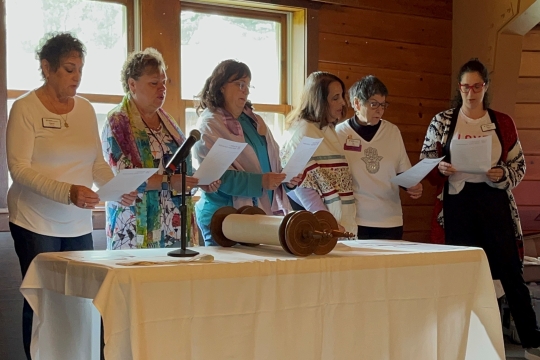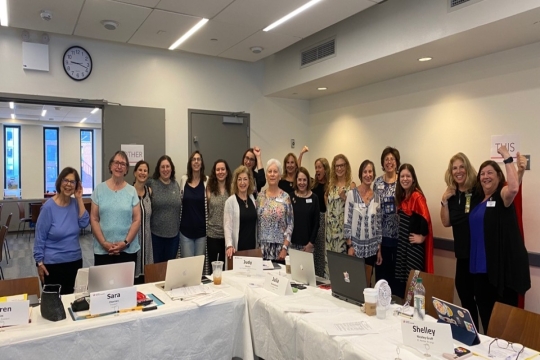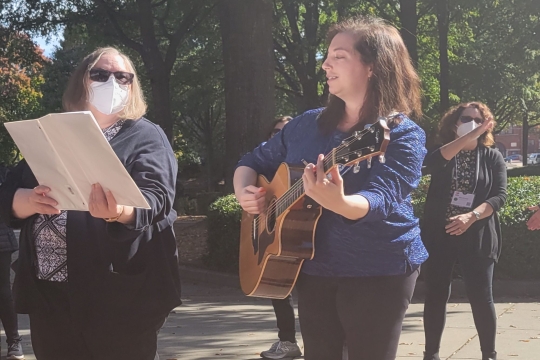Recently, the Mission Statement for our Sisterhood in Miami was modified to end with “… as a legacy for our daughters and granddaughters”. I hope that legacy includes a willingness to persevere through the challenges that will always be present. Changing our language was part of an attempt to clarify our “Why”, an ongoing quest for meaning that reminds us to be flexible, inspiring, and dynamic.
It is so easy to get caught up in the day-to-day activities, yet we all know that the greater good is far more meaningful and profound. The “Why” can be our key to creating long-lasting value & purpose, sustainability, and increased membership.
How do we negotiate our way through the challenges that abound and remain focused on the “Why”? How do we persevere when we regularly face difficulty and delays?
This week’s parashah may offer some ideas. In Chayei Sarah (Gen. 23:1 – 25:18), Sarah has died after 127 years of life and after finally bearing Isaac, her only child. The portion begins by detailing Abraham’s dealings with the Hittites for the land where he wants to bury his wife. There are three sets of negotiations: He initially asks for a gravesite & the Hittites answer that he may bury his dead in any gravesite. Then, Abraham explains that he wants the cave of Machpelah; Ephron, the owner of that land, offers the field, and the cave that is in, it as a gift. Finally, Abraham explains that he wants to pay the price for the field; Ephron agrees and charges a large sum, which Abraham agrees to.
The negotiations and the stance that Abraham takes are fascinating. Why didn’t he simply accept the gift of the grave site and the cave? Why did he insist on buying the land? After all, the gift would have sufficed – – it was a place to bury the dead, both present and future, and it was in the desired location. Essentially, the first two negotiations were examples of not getting the message across clearly; so where did he find the fortitude to negotiate time and again with hosts in a foreign land?
I liken these questions to those that we encounter every day relative to our Sisterhood connections: How do we persist in remaining true to our passions – whether they be social justice, women’s rights, legislative changes, supporting leadership development or supporting the YES Fund – when the world around us is making so many other demands? How do we choose our priorities, find the joy in what we are doing, and to what extent can and should we negotiate for our wishes?
Abraham realized the value of his commitment to ownership of the land; he stayed with the negotiations and demonstrated that his purchase was key to a significant investment in the land, and therefore a significant investment in the future. After all, it took three sets of negotiations for Abraham to get what he wanted; he always offers great lessons in leadership!
Abraham knew that the grave site for his beloved Sarah, mother of Isaac, was the means to honor her life and their past while ensuring that it would be there for the use of future generations. The sale of the land created a true b’rit, a covenant between the sellers, and more importantly between man and the land.
In our commitment to WRJ and the pursuit of sustainability, we can memorialize the past and design the future by standing firm, sometimes shaking up expectations. Some people will call us “stubborn”; I prefer to see us as committed. Abraham’s negotiations remind us that Sisterhood goals are about something much bigger than ongoing gatherings, events and activities; the negotiations mirror our need to persevere in creating value.
A truly successful Sisterhood will constantly be experimenting with how we represent and share our relevance in this dynamic, ever-changing and fast-paced world. We remember and reiterate that we are part of a greater good. We take a stand for our beliefs and commitments while being flexible and open to new ideas and perspectives.
In his essay on To Grow in Wisdom, Abraham Joshua Heschel says:
“To attain a sense of significant being we must learn to be involved in thoughts that are ahead of what we already comprehend, to be involved in deeds that will generate higher motivations.”
As a forefather of the Jewish people, Abraham stood firm on what he felt was best for the future generations. In creating our all-important legacy, we take heart in knowing that WRJ is the standard bearer for Reform Jewish women, and that we will assert ourselves and persist in being the light for what we believe in and desire for future generations.
Pamela Lear is the Immediate Past President of the Sisterhood of Temple Beth Am in Miami, FL. She currently serves as an Area Director on the WRJ SE District Board and is on the North American Board of WRJ.
Related Posts

Parashat Yom Rishon shel Rosh HaShanah

Cultivating a Culture of Accountability and Belonging

